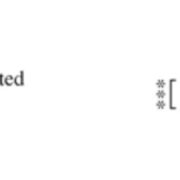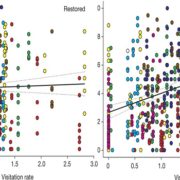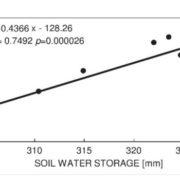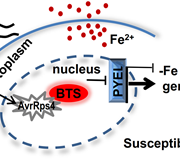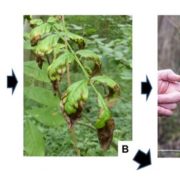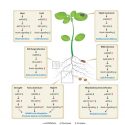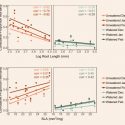Untargeted metabolomics reveals host plant chemistry before and after pea aphid infestatation (Front. Plant Sci)
 Pea aphids are genetically diverse, with different biotypes (or “host races”) having different host plant preferences. Sanchez-Arcos et al. reveal several relationships between plant metabolite production and the possibility of colonization of certain aphid host races. Using UHPLC- MS analysis of the extracts of Medicago sativa, Trifolium pratense, Vicia faba and Pisum sativum before and after the exposure of different host races of Acyrthosiphon pisum, metabolic profiles were analyzed and correlated. The authors found that profiles change before and after the infestation depending the species of plant. Unique metabolites changes are related to the potential of acceptance or rejection of the host plant aphid hosts. Principal groups of metabolites related to a reduction of population growth due to their deterrent activities are: flavonoids, saponins, triterpenes and peptides. Finally the authors conclude that the technique of untargeted metabolomics allows discovery of plant metabolites with crucial importance in interactions between plants and herbivores or pathogens, revealing susceptibility or resistance. (Summary by Laura Alejandra Mejía Agudelo) Frontiers Plant Sci. 10.3389/fpls.2019.00188
Pea aphids are genetically diverse, with different biotypes (or “host races”) having different host plant preferences. Sanchez-Arcos et al. reveal several relationships between plant metabolite production and the possibility of colonization of certain aphid host races. Using UHPLC- MS analysis of the extracts of Medicago sativa, Trifolium pratense, Vicia faba and Pisum sativum before and after the exposure of different host races of Acyrthosiphon pisum, metabolic profiles were analyzed and correlated. The authors found that profiles change before and after the infestation depending the species of plant. Unique metabolites changes are related to the potential of acceptance or rejection of the host plant aphid hosts. Principal groups of metabolites related to a reduction of population growth due to their deterrent activities are: flavonoids, saponins, triterpenes and peptides. Finally the authors conclude that the technique of untargeted metabolomics allows discovery of plant metabolites with crucial importance in interactions between plants and herbivores or pathogens, revealing susceptibility or resistance. (Summary by Laura Alejandra Mejía Agudelo) Frontiers Plant Sci. 10.3389/fpls.2019.00188


